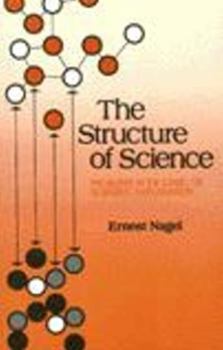The Structure of Science: Problems in the Logic of Scientific Explanation
Select Format
Select Condition 
Book Overview
"Ernest Nagel's work, The Structure of Science , has earned for itself the status of an outstanding standard work in its field. It offers an exceptionally thorough and comprehensive methodological and... This description may be from another edition of this product.
Format:Paperback
Language:English
ISBN:0915144719
ISBN13:9780915144716
Release Date:June 1979
Publisher:Hackett Publishing Company
Length:640 Pages
Weight:1.40 lbs.
Dimensions:1.3" x 5.5" x 8.6"
Customer Reviews
1 rating
The Documentation of the Nature of Science
Published by Thriftbooks.com User , 16 years ago
There is lots of talk among people over what "science" really is and what constitutes "scienticity". Despite the fact that the word science comes from the Latin word "scientia" (literally meaning "knowledge"), most defenders of science are simply not familiar with what "science" truly is. Most people seem to blindly and ignorantly assume that science is "empirically verified" or "conclusive" or "strictly observationally based" or "skeptical" or "exclusively inductive" or "strictly peer reviewed" or other ignorant maxims popularized by inferior science magazines and channels [National Geographic, Discovery, Scientific American, etc.]. In reality science is all over the place and really overlaps superstitions at times too. Basic things people do, play key roles in science like inquiry, thought, and reason as the basis of investigations of nature as is the basis also for investigating local news or picking a car insurance wisely or how to invest one's own money or how to solve a neighbor's personal problems. This work puts many of these cherished beliefs to rest by describing with heavy detail the very nature of science as ultimately, as I usually say, "reasonable and explanatory, but ultimately metaphysical". Truly Ernest Nagel does a phenomenal job of putting science where it belongs - as philosophy. Natural Philosophy to be more precise. Empiricism and physical evidence constitute a decent chunk of "science", but overall, metaphysical aspects like theories, mathematical rigor (if math is even used), basic common logic, laws, models, and "certainty" make up for the vast majority of what is called "Science". The words "Nature", "Science", and "Technology" are not the same thing and should NOT be used interchangeably due to their separate spheres of occurrence: OUR observance or detectability (Nature), assumption and modeling (Science), and application (Technology). It should be remembered that generally Nature and Technology are the first to emerge due to practicality and Science is usually the last to emerge usually due to philosophical debates, modeling problems such as correct or incorrect assumptions and dealing with ignoring or explaining anomalies. Science is not physical (tangible reality via the 5 senses) at all, it is metaphysical (methodology, knowledge, understanding, ideas, thinking, reasoning, verification, clarification, assumption, inquiring (what, when, where, how, why), explanation, validation, prediction, modeling, numerical approaching, and truth seeking). We all gather information from nature all the time, but it's what we do with the gathered information that makes up science. This book does a good job of making the distinction that Science is not Nature and that Nature is not Science. The study and attempt of simulation of nature is what leads to any science, whether it be a superstitious science, statistical science , an abstract science, a true science, or a false science. Science is a branch of philosophy, not a separat





